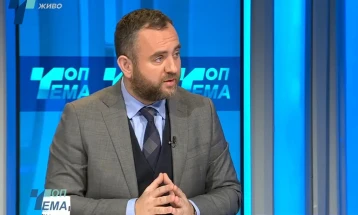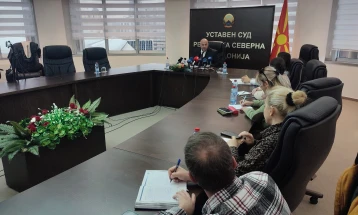EC notes generally favorable media freedom context and below-average salaries of journalists

Skopje, 14 October 2022 (MIA) - North Macedonia has achieved some level of preparation/ is moderately prepared in the area of freedom of expression. Overall, it made limited progress during the reporting period to address the previous recommendations. The general context is favourable to media freedom and allows for critical media reporting although there were some tensions during the 2021 local elections. Action on self-regulation of the media should resume and produce practical results in advancing professional standards of journalism, says the European Commission in the section on freedom of expression within the Progress Report on North Macedonia.
The report says journalists’ labour and social rights are represented by the Independent Trade Union of Journalists and Media Workers. Journalists working for of the public service broadcaster and of news information agencies are organised in separate unions. The unions’ dialogue with the government needs to be improved, in order to find acceptable solutions to persisting challenges, such as the high number of short-term or part-time contracts without health and social insurance.
It notes that most media workers’ income is lower than the national average salary. Labour rights, such as the right to annual leave, paid overtime hours and paid night shifts, are often disregarded.
“Numerous media outlets lack an internal code of ethics, as well as professional and career opportunities for professional training. Many journalists have a vulnerable contractual status and difficult socio-economic conditions which contributes to a culture of self-censorship and creates openings for media owners to strongly influence editorial policy. Further efforts are needed to protect journalists’ professional and labour rights, freedoms and security,” reads the report.
It says that freedom of expression and pluralistic viewpoints continued to thrive in a generally favourable overall political context. Despite this, the media reforms expected stalled due to a lack of political consensus and a shift in focus due to the COVID-19 pandemic.
According to the report, authorities need to step up their efforts to reform the public service broadcaster, ensuring its independence, professional standards and financial sustainability. The reform process of the public service broadcaster, in line with its five-year development strategy, is constrained by delays in appointing members of its programming council. The council of the Agency for Audio and Audiovisual Media Services still needs to be appointed. The labour rights of journalists still need to be addressed.
“Last year’s recommendations remain valid. In the coming year, the country should revise the legal framework governing the media in accordance with the EU acquis and European standards, in particular by continuing work to align national laws with the revised European Directive on Audiovisual Media Services; step up action to implement the strategy to reform the public broadcaster and finalise appointments for the public service broadcaster's programme council and the media regulator's council; promptly address all instances of threats and acts of violence against journalists and ensure that the perpetrators are brought to justice,” reads the document.
The EC notes that the allocation of state funds for the broadcasting sector, securing the budget for the public service broadcaster, media regulator and broadcasting public enterprise, has been further reduced in 2021.
“The Parliament further delayed the appointment of the members of the media regulator and the public broadcaster councils, in accordance with the Law on Audio and Audio-Visual Media Services (LAAVMS),” it adds.
The comprehensive reform of the public service broadcaster was further delayed. Despite the requirements of the Law on audio and audiovisual media services specifying the amount of public funding for the public broadcaster as a percentage of the state budget to be 1% as of 2021, the actual rate only reached 0.59% in July 2022 because of the authorities’ use of the discretionary powers granted by law.
“This was insufficient. The total budget of the Public Service Broadcaster in 2021 amounted to 13.4 million EUR, while in 2022 it is 15 million EUR. The financing of the public broadcaster has seen a steady decline over the last few years. The continuous decrease in funding is hindering implementation of the public service broadcaster development strategy, creating uncertainty in planning processes and affecting the overall quality of performance,” says the report.
Turning to economic factors, the report says the COVID-19 outbreak exacerbated the ongoing trend in lower income for the media industry, leading the government to adopt measures to help the industry.
“Additional steps are needed to support professional and investigative journalism. The Media Agency monitors media ownership on a regular basis. Efforts must be made to safeguard the media's independence from political intrusion. Advertising by the government on commercial channels is prohibited. Media associations continued to express their concern about the prospect of amending Article 102 of the Law on audio and audiovisual media services to allow state-funded public-interest campaigns. The media associations also expressed concern over the prospect of political parties using state funding to advertise in the media as a potential way to gain political influence on editorial lines,” reads the document.
The process of alignment of the Law on audio and audiovisual media services with the EU acquis needs to continue. In September 2021, Parliament adopted amendments to the Electoral Code related to the media and to paid political advertising. The OSCE/ODIHR report on the local elections recommended that regulations on paid political advertisement in the media should be reconsidered, in order to allow unimpeded access to the media based on reasonable and objective criteria.
“The practice of providing paid political advertising in broadcast, print and online media funded from the state budget continues to be a concern among media associations, due to the risk of political influence on media independence. Affected by a declining media market and the pandemic, some media outlets have lobbied actively to remove the ban on government advertising in the private media, in order to increase their revenues. However, media associations have criticised the prospect of amending the Law on audio and audiovisual media services, which would allow advertising of public institutions in the media, highlighting the risk that it could undermine the independence of the media and disrupt the media market,” says the EC.
The report notes that in 2021, the Ministry of Interior recorded eight cases of attacks against journalists (ten cases in 2020). Criminal charges were brought in three cases (for a crime committed during a protest, a breach of copyright and related rights and an online threat). Investigations for the remaining five attacks are ongoing. The association of journalists recorded five attacks, three of them against female journalists. During the 2021 local elections, the number of incidents involving journalists increased, which was condemned by the Agency for Audio and Audiovisual Media Services and the association of journalists.
“The existing legal framework and commitment to international standards provided sufficient mechanisms for law enforcement authorities and the Public Prosecutor’s Office to bring perpetrators to justice. Further action is needed to ensure impartial, speedy and effective investigations. A TV station complained of prolonged financial investigations and its journalists being invited for information talks by the prosecution office. Politicians from all levels of governance and public officials should constantly set an example of high standards for the respect of freedom of media in their interactions with journalists. Online harassment and verbal attacks on journalists, notably on social media, have continued. Old cases of physical attacks against journalists remain unresolved,” reads the report.
It adds that hate speech is prohibited both online and offline, but it persists online. In December 2021, an online threat to journalists published on social media was sanctioned by a court judgment.
“In 2021, the Council of Media Ethics received 109 complaints for breaches of ethical standards, 90% of which concerned online cases. The self-regulatory body noted breaches of the Code of Journalists in 48 cases. The Council of Media Ethics reported increased pressure over its work from political and economic actors, but also from media representatives. In 2021, the association of journalists reported a decrease in court cases for insult and defamation involving journalists, from 30 cases in 2020 to around 20 ongoing cases. In 2021, a total of 81 court rulings were issued in connection with Article 10 of the European Convention for Human Rights, against 57 in 2020 and 99 court rulings in 2019 respectively,” says the EC.
It notes that online media is not governed by a specific law, and there are differing views on the need for regulation, especially in view of the growing threats from disinformation.
“Online media and social media platforms are the main source of disinformation, misinformation, hate speech, breaches of professional standards and intellectual property rights infringements. Campaigns are needed to boost the understanding of stakeholders and the general public and increase their resilience in the face of disinformation, are needed. Media associations continued to promote the established registry of online media (promedia.mk) in order to increase professionalism and standards of online journalism. With regard to access to information, the Agency for the Protection of Free Access to Public Information received 798 complaints, of which 608 were predominantly from civil society organisations, while 190 complaints were filed by individuals,” reads the report.







